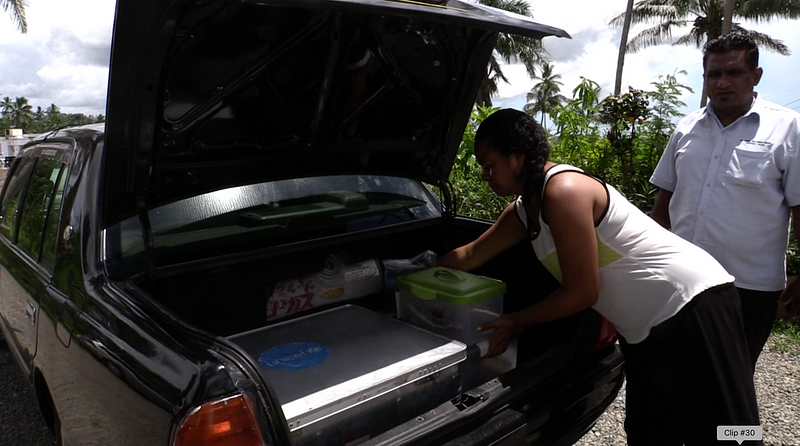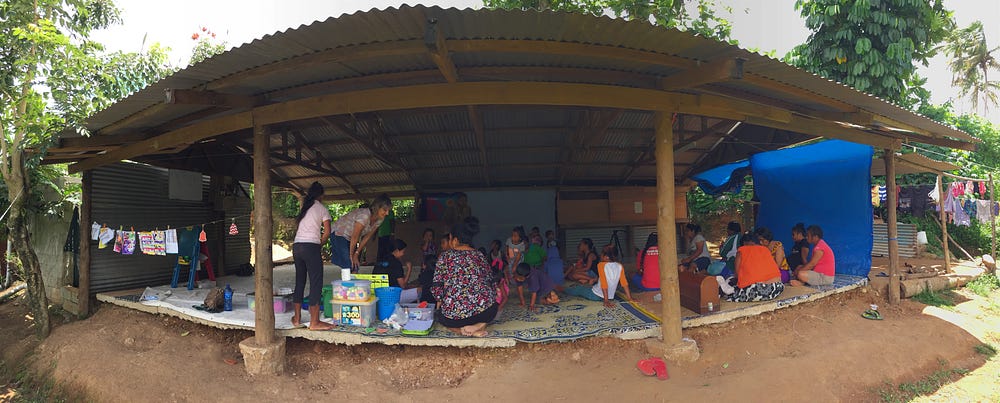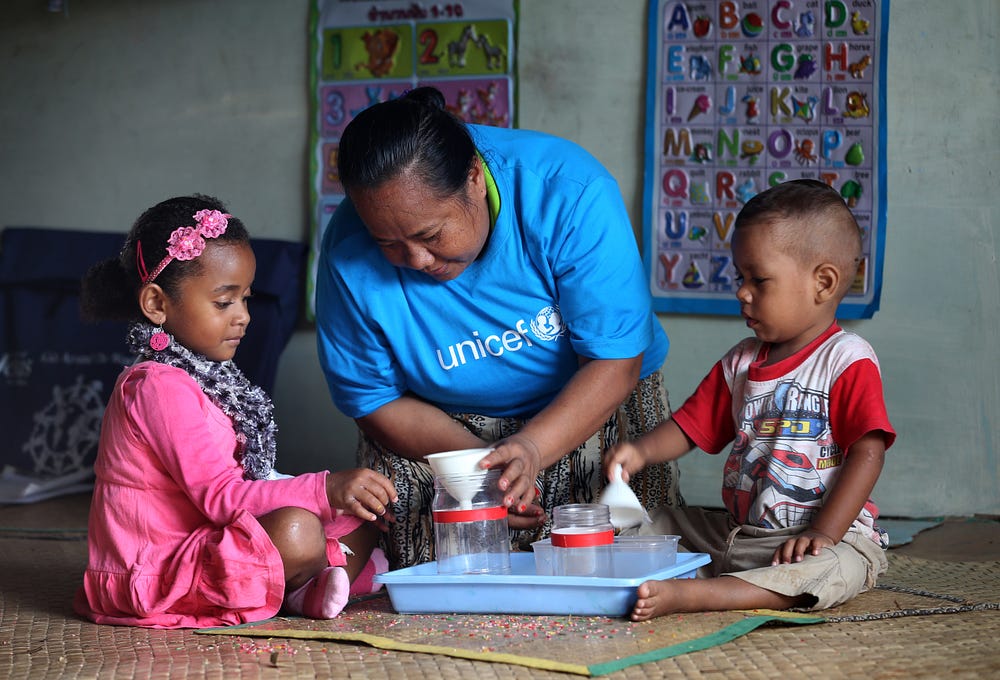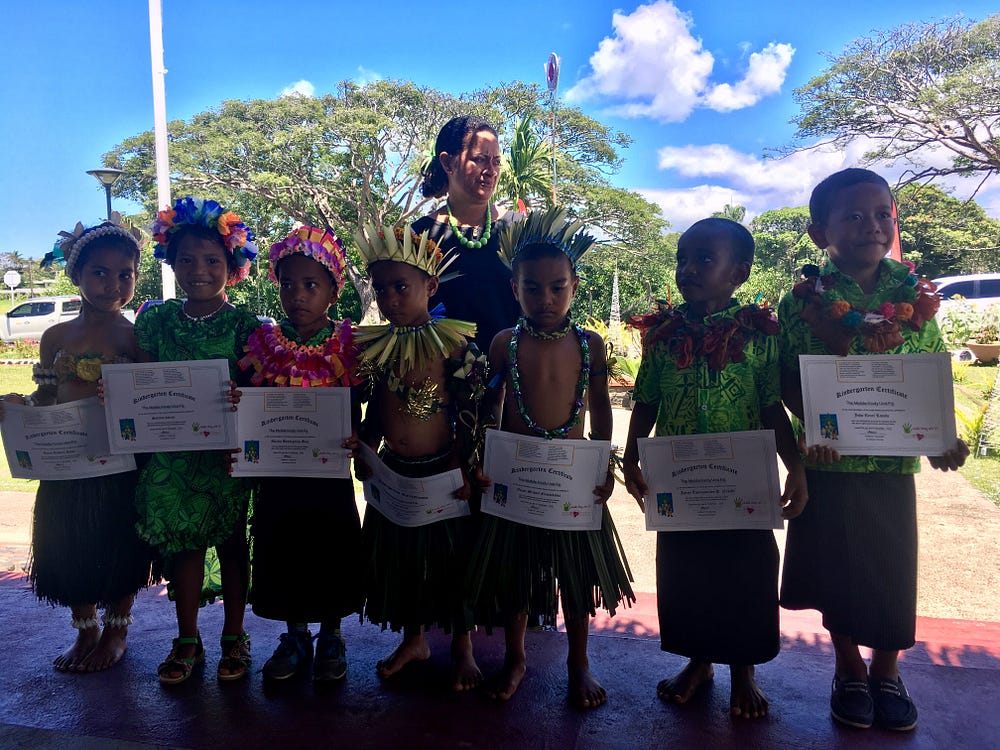“Goodbye,
see you tomorrow!,” shouts Teacher Arara as she closes the lock of the
white picket fence and waves goodbye to the last few pre-schoolers
getting into their cars with their parents. It is 12:30 in the afternoon
and the day quiets down after the usual flurry of morning play and
activity at Little Ones Learning Centre in Suva, Fiji.
Located
atop a hill in Tamavua area, Little Ones is one of the city’s leading
private preschools and boasts highly-trained teachers and well-resourced
classrooms.
Teacher
Arara looks out onto the view and enjoys the fresh breeze, but the lull
is short-lived. Soon after, she hustles towards the school’s storeroom,
counting sheets of paper, packing tubs of paints and brushes, sorting
Lego blocks and puzzles, identifying storybooks, and stuffing all of
these materials into a big silver metal container — a UNICEF
kindergarten-in-a-box kit.
A
taxi is hailed and Teacher Arara hauls the case, along with several
jugs of water, into the boot. She gets into the taxi and bids the driver
to head to Teroro settlement, a few miles from Little Ones. She is off
to her next kindergarten class for the day.

Teacher
Arara arrives at Teroro greeted by a bunch of beaming young faces eager
to help their teacher. They manage to take the metal case and gingerly
walk it down the meandering concrete stairs from the road downhill into
the community.
They
stop right in the centre of the settlement, in a patio propped up by
wooden slabs and tarpaulin, bordered by temporary houses, but looking
out on an open side to the greenery of Suva’s hills.
Teacher Arara gathers the children and begins her lessons, unloading materials out of her silver container as needed.
The
activities at this makeshift kindergarten are similar to those at
Little Ones — play-based learning activities so that children can see,
touch, and interact with materials as they learn to control their motor
skills, make connections between concrete objects and ideas, and
socialize with peers.
The
class is clearly a pared-down version of a typical preschool — in fact
there are no tables and chairs — but there are enough basic materials to
stimulate learning. The class sings rhymes, recites the alphabet, and
completes classroom routines, exposing the young children to the type of
organised learning that occurs in primary school. The children also
enjoy free and healthy snacks — milk, sandwiches, fruit and vegetable
sticks — which have become an undeniable draw for the children and their
parents.

The
class at the Teroro settlement is part of the Mobile Kindy project
which provides early childhood care and education (ECCE) services in
hard-to-reach communities in Suva, Fiji. These areas are often informal
settlements where most families lack access to many social services,
including ECCE centres.
By
bringing mobile learning environments to these areas, young children
are able to attend some form of preschool, gain critical cognitive and
socio-emotional skills, and become better prepared to enter formal
schooling.
Since
the activities are within the community, parents, mostly mothers, are
also able to drop in and get exposed to simple but effective learning
activities for children. The parents also receive other forms of
support, as mobile kindy staff connect them to public services like
health programmes, birth registration, and social welfare agencies.
Mobile
Kindy, short for mobile kindergartens, is a partnership between UNICEF
and the Little Ones Learning Centre. UNICEF provides funding, oversight
and technical assistance, while Little Ones is the main implementer of
the programme. In 2016 alone, the mobile kindy has provided education to
300 children in six sites and have referred many families to other
public welfare programmes. In addition, following Cyclone Winston, the
mobile kindy has gone to affected communities, reaching 138 children in 9
communities so far.

Analesi
Tuicaumia, director of Little Ones and the Mobile Kindy programme, is
proud of what has been achieved to date. She credits the support of
UNICEF for emboldening her team to grow the number of sites and to think
creatively about resourcing high-quality learning materials.
She
shares a recent incident during the entrance exams of a major primary
school in Suva. There were two applicants — one from Little Ones and the
other from a mobile kindy. Analesi exclaims, “The teacher cannot tell
the difference — who is from Little Ones and who is from the mobile
kindy! They both did so well.”
On
December 8, 2016, the Mobile Kindy held its graduation of its 4th round
of students — 31 young children from across all mobile kindy sites who
are advancing to Class 1 in primary school. The Assistant Minister of
Health, Honourable Alexander O’Connor was chief guest at the ceremony.
He cited the importance of establishing health, nutrition and hygiene
habits in the early years and acknowledged how this was being fulfilled
in the mobile kindys. He added, “Optimizing the early years of
children’s lives is the best investment we can make as a society in
ensuring their future success.”

At
the graduation ceremony, Teacher Arara seems happy but also tired. She
explains that December will finally give her the chance for a longer
break, although she quickly retorts, “And next year, we start all over
again!”
UNICEF
Pacific promotes the rights and well-being of every child, in
everything we do — maternal and child health, nutrition, HIV and AIDS,
child protection, education, water, sanitation and hygiene as well as
policy, advocacy, communication for development, planning and
evaluation. Our multi-country programme and office located in Fiji
covers the Cook Islands, Fiji, Kiribati, Marshall Islands, Federated
States of Micronesia, Nauru, Niue, Palau, Samoa, Solomon Islands,
Tokelau, Tonga, Tuvalu and Vanuatu.
No comments:
Post a Comment